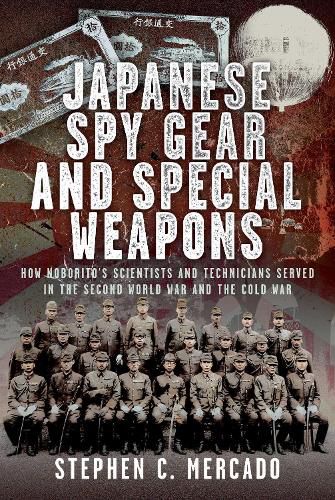Readings Newsletter
Become a Readings Member to make your shopping experience even easier.
Sign in or sign up for free!
You’re not far away from qualifying for FREE standard shipping within Australia
You’ve qualified for FREE standard shipping within Australia
The cart is loading…






The technicians of the 9th Military Technical Research Institute, known as the Noborito Research Institute, toiled in the shadows of the Second World War to develop spy gear and special weapons for the Imperial Japanese Army (IJA). Their espionage devices, including secret inks, bugging devices, and miniature cameras, helped the Army's dreaded Kempeitai and the shadowy Yama Agency counter foreign spies and track domestic dissent. Operatives of the IJA's Nakano School for intelligence operatives and commandos took the equipment into the field with them. Noborito's forgers reproduced Chinese currency in an operation to wreck China's economy. Scientists and technicians tested biological weapons on Chinese prisoners as part of a top-secret project fielded by the IJA's infamous Unit 731 and developed a virus into a weapon to strike at America's cattle herds. Others developed bombing balloons to attack the American heartland, a target that lay far beyond Japan's reach by conventional means. Stephen Mercado provides, in this first book in English on an intelligence organization little known outside Japan, an absorbing account of Noborito's activities. The author further recounts how, in the shadows of Occupied Japan, Noborito veterans entered US military service in secret, then applied their skills to operations during the Korean War and for years afterwards in the Cold War. Other veterans applied their skills to rebuilding Japan and turning the vanquished empire into a postwar industrial power. This story is one of talented technicians who served their country in war and peace. AUTHOR: Stephen Mercado, the author of The Shadow Warriors of Nakano: A History of the Imperial Japanese Army's Elite Intelligence School, has also written a dozen articles and several dozen book reviews on Asian and open-source intelligence. His writing has appeared in the journals Intelligence and National Security, International Journal of Intelligence and Counter Intelligence, Studies in Intelligence and on the website 38 North of the Henry L. Stimson Center. His translations include numerous declassified Chinese and Japanese diplomatic documents published as part of the Woodrow Wilson Center's Cold War International History Project. Retired from the CIA Open Source Enterprise, he has twice won a CIA Studies in Intelligence award for his writings. He holds a master's degree in international affairs from Columbia University's School of International and Public Affairs. 20 b/w illustrations
$9.00 standard shipping within Australia
FREE standard shipping within Australia for orders over $100.00
Express & International shipping calculated at checkout
The technicians of the 9th Military Technical Research Institute, known as the Noborito Research Institute, toiled in the shadows of the Second World War to develop spy gear and special weapons for the Imperial Japanese Army (IJA). Their espionage devices, including secret inks, bugging devices, and miniature cameras, helped the Army's dreaded Kempeitai and the shadowy Yama Agency counter foreign spies and track domestic dissent. Operatives of the IJA's Nakano School for intelligence operatives and commandos took the equipment into the field with them. Noborito's forgers reproduced Chinese currency in an operation to wreck China's economy. Scientists and technicians tested biological weapons on Chinese prisoners as part of a top-secret project fielded by the IJA's infamous Unit 731 and developed a virus into a weapon to strike at America's cattle herds. Others developed bombing balloons to attack the American heartland, a target that lay far beyond Japan's reach by conventional means. Stephen Mercado provides, in this first book in English on an intelligence organization little known outside Japan, an absorbing account of Noborito's activities. The author further recounts how, in the shadows of Occupied Japan, Noborito veterans entered US military service in secret, then applied their skills to operations during the Korean War and for years afterwards in the Cold War. Other veterans applied their skills to rebuilding Japan and turning the vanquished empire into a postwar industrial power. This story is one of talented technicians who served their country in war and peace. AUTHOR: Stephen Mercado, the author of The Shadow Warriors of Nakano: A History of the Imperial Japanese Army's Elite Intelligence School, has also written a dozen articles and several dozen book reviews on Asian and open-source intelligence. His writing has appeared in the journals Intelligence and National Security, International Journal of Intelligence and Counter Intelligence, Studies in Intelligence and on the website 38 North of the Henry L. Stimson Center. His translations include numerous declassified Chinese and Japanese diplomatic documents published as part of the Woodrow Wilson Center's Cold War International History Project. Retired from the CIA Open Source Enterprise, he has twice won a CIA Studies in Intelligence award for his writings. He holds a master's degree in international affairs from Columbia University's School of International and Public Affairs. 20 b/w illustrations